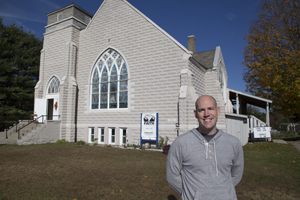ABOUT THIS SERIES: Vermont is a unique mission field, but North Carolina Baptists are helping increase the gospel influence in this New England state. See related story.
Second part in a series
You could drive by and miss the town of Pownal, a sprawling rural town in Vermont’s southwest corner bordering New York to the west and Massachusetts to the south.
|
BSC photo by Mike Creswell Jayson Dominey moved to Vermont in 2015 to become pastor of Faith Christian Fellowship, which has been extensively renovated by N.C. Baptist volunteers. He is from New Bern, N.C. |
City slickers might say that about most of Vermont’s small towns, but Pownal really is harder to see.
The town has three sections, all of them rural, and beyond a small post office with a history plaque out front commemorating a 1946 event, there’s nothing like a Main Street that would tell you it’s a town.
A long-closed factory building sits rusting away. About 3,500 people live on Pownal’s hills and valleys that try to keep flat land at bay.
Jayson Dominey and his family moved to Pownal from New Bern, N.C., which has 10 times as many people and many more places to eat than one will find in Pownal.
But that’s not the main difference Dominey wants to talk about. It’s not even that Pepsi-Cola was invented in New Bern and not Pownal.
It’s much more serious: New Bern has many churches.
Pownal, on the other hand, has just two Bible-believing churches, including Faith Christian Fellowship, the Baptist church Dominey pastors.
If the two congregations had 100 people combined on a Sunday, it would be considered a very good Sunday.
The Pownal area is considered especially resistant to the gospel, partly because in earlier times it was settled mostly by non-believers.
“Some people here have had no contact with a Christian church in five or six generations,” Dominey said.
But again, that’s changing. Dominey is elated that three new families have joined Faith this year.
“Fantastic!” he exclaimed. Dominey is well aware that evangelism is a slow process here.
Faith was first established by American Baptists back in 1784 and Dominey figures its heyday was in the 1940s and 1950s. By the 1980s, the church had lost members and was struggling. Conservative Baptists replanted it in 1988.
A Conservative Baptist pastor led Faith for 28 years before retiring and moving back to Pennsylvania. Dominey, who had come here in 2015 as associate pastor, was asked to become lead pastor in January 2017.
Moving here was a big step for the Domineys and their now six children. “We knew it would be an adjustment, but we decided this was where God wanted us to be,” he said.
Just as the Domineys have North Carolina roots, so does Faith Church in a sense.
N.C. Baptist volunteers renovated the sanctuary so that it is by far one of the nicest-looking structures around.
And the adjoining 1,100-square-foot home was well built – and, importantly, well insulated – by volunteers from North Carolina.
That house is heated by a single wood-burning stove.
Dominey admits learning to start a fire and keep it going was a challenge the first winter.
Mount Nelson Missionary Baptist Church in Eureka, N.C., has sent teams to Pownal twice to work. They held Bible clubs for local kids.
A team from Buncombe Baptist Association, made up of churches in the Asheville, N.C., area held a Vacation Bible School in a local community and reached 35 to 40 kids during the week in mid-2017. They also gave kids backpacks packed with food.
Teams have repainted the church’s exterior, installed cabinets and lighting in the kitchen area and poured work into the 106-year-old building in many other ways.
This kind of help from the South has been absolutely critical to the church’s survival, Dominey said.
“We want the church to be strong and healthy. That’s our long-term goal,” Dominey said. “We’re able to touch so many more lives because of their help than we could ever do on our own.
“We’re five generations into lostness here, but it only takes a generation to lose the church,” Dominey said, adding that he is also concerned that the same generational decline is happening to some rural churches back in his home state of North Carolina.

